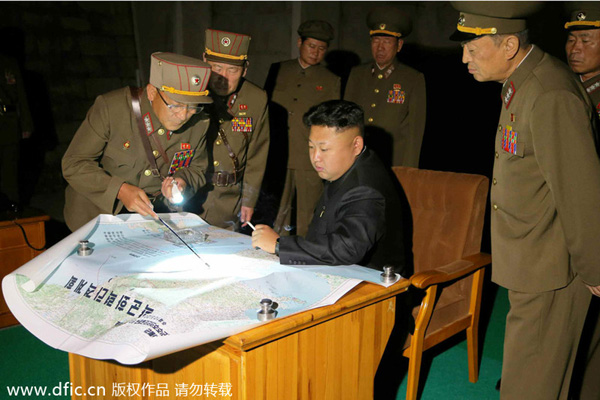More openness needed to update China-DPRK ties
Updated: 2015-01-31 08:02
By Hu Mingyuan(China Daily)
|
||||||||
|
|
|
Kim Jong-un gives field guidance on a tactical rocket firing drill of DPRK. [Photo/IC] |
The Democratic People's Republic of Korea has reportedly dismissed all officials, including the head of Pyongyang's Supreme Guard Command, considered responsible for a DPRK army deserter crossing the border last month and killing four Chinese nationals while trying to commit robbery. The suspected DPRK army deserter died later of the injuries suffered during his capture, China's Foreign Ministry spokesman Hong Lei said on Jan 7.
Beijing lodged a protest with Pyongyang right after the incident but in response has received only deep regrets. But if the report of the removal of the Pyongyang officials is true, it has to be said the DPRK has had a drastic change of mind.
By holding the military leadership accountable for the shooting and robbery incident, DPRK leader Kim Jong-un has sought to not only appease the public rage in China, but also strengthen China-DPRK relations, which is equally important for Beijing.
China and the DPRK both should realize that when confronted with an emergency near the border that endangers the life and property of Chinese or DPRK nationals and poses a threat to bilateral relations, the most sensible thing to do is to establish instant communication and discuss how to resolve the issue.
Apart from informing the DPRK of its nationals' illegal entry into China and the crimes they have committed, Beijing should also urge Pyongyang to strengthen its border management to prevent its citizens from crossing into China. In the meantime, China should keep pursuing the foreign policy of building good relations and partnerships with its neighbors.
China's humanitarian aid to the DPRK, which for some time has been suffering from a sluggish economy because of international sanctions, has helped boost bilateral ties. But the West has been baselessly misinterpreting the humanitarian aid as proof of a strategic alliance between China and the DPRK. Besides, some leaders and observers also demonize the DPRK for its nuclear program and human rights record.
As a responsible and rising country, China has been making constant efforts to resume the Six-Party Talks, stalled since December 2008, to help resolve the DPRK nuclear issue through peaceful means. Chinese Foreign Ministry spokeswoman Hua Chunying reiterated the country's stance on Jan 23, saying: "Under the current situation, parties concerned should work together to return to the track of dialogue and consultation to create conditions for the resumption of the Six-Party Talks."
Contrary to the popular Western perception, when the DPRK insisted on conducting its third nuclear test despite strong opposition from the United Nations and China, Beijing-Pyongyang ties began cooling down. Moreover, Kim Jong-un, who assumed power as the top DPRK leader in 2011, has not visited China (or any other country). In fact, he plans to attend Russia's celebrations in May to mark the Soviet Union's victory over Germany in World War II, which means he could pay his first foreign visit as DPRK leader to Moscow.
No wonder, many people speculate that the shooting incident near the China-DPRK border might deal a blow to Beijing-Pyongyang ties. The fact that the incident was first reported by the Chinese media, unlike similar cases in the past which were first highlighted by the Republic of Korea media, has added to the speculations. To prevent people from misinterpreting such developments and making wild speculations over them, China and the DPRK have to make relevant information more transparent.
The author is an associate researcher at the Center for Northeast Asian Studies, a research institute in Jilin province.
(China Daily 01/31/2015 page4)
- Global health entering new era: WHO chief
- Brazil's planning minister steps aside after recordings revelation
- Vietnam, US adopt joint statement on advancing comprehensive partnership
- European border closures 'inhumane': UN refugee agency
- Japan's foreign minister calls A-bombings extremely regrettable
- Fukushima impact unprecedented for oceans: US expert

 Stars of Lijiang River: Elderly brothers with white beards
Stars of Lijiang River: Elderly brothers with white beards
 Wealthy Chinese children paying money to learn British manners
Wealthy Chinese children paying money to learn British manners
 Military-style wedding: Fighter jets, grooms in dashing uniforms
Military-style wedding: Fighter jets, grooms in dashing uniforms
 Striking photos around the world: May 16 - May 22
Striking photos around the world: May 16 - May 22
 Robots help elderly in nursing home in east China
Robots help elderly in nursing home in east China
 Hanging in the air: Chongqing holds rescue drill
Hanging in the air: Chongqing holds rescue drill
 2.1-ton tofu finishes in two hours in central China
2.1-ton tofu finishes in two hours in central China
 Six things you may not know about Grain Buds
Six things you may not know about Grain Buds
Most Viewed
Editor's Picks

|

|

|

|

|

|
Today's Top News
Liang avoids jail in shooting death
China's finance minister addresses ratings downgrade
Duke alumni visit Chinese Embassy
Marriott unlikely to top Anbang offer for Starwood: Observers
Chinese biopharma debuts on Nasdaq
What ends Jeb Bush's White House hopes
Investigation for Nicolas's campaign
Will US-ASEAN meeting be good for region?
US Weekly

|

|










